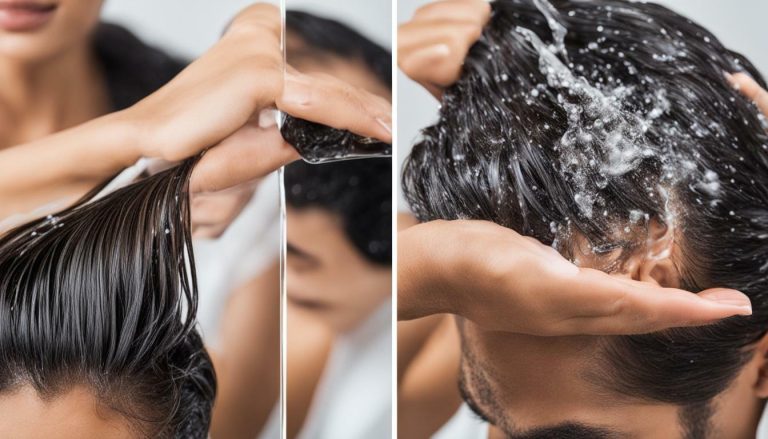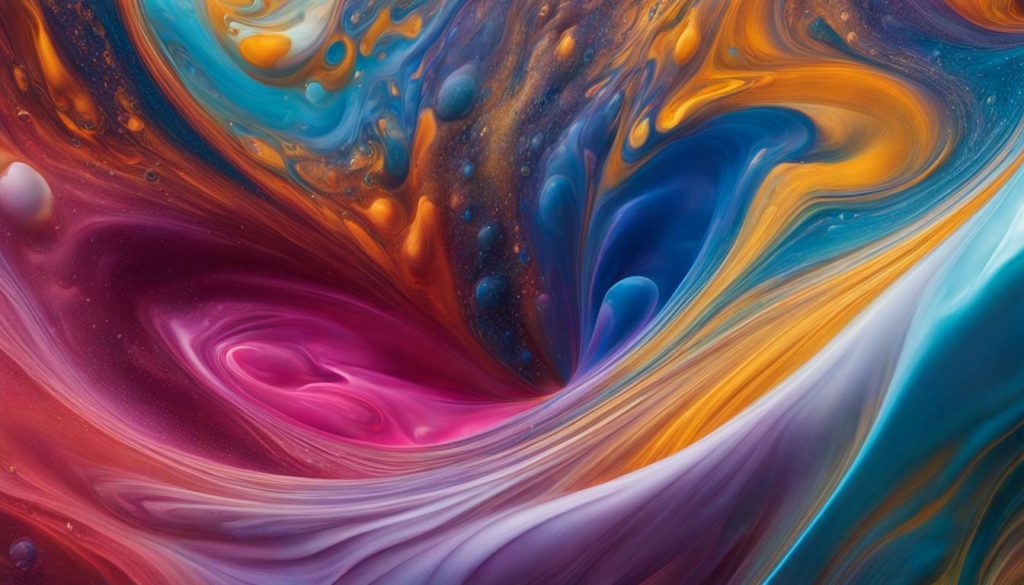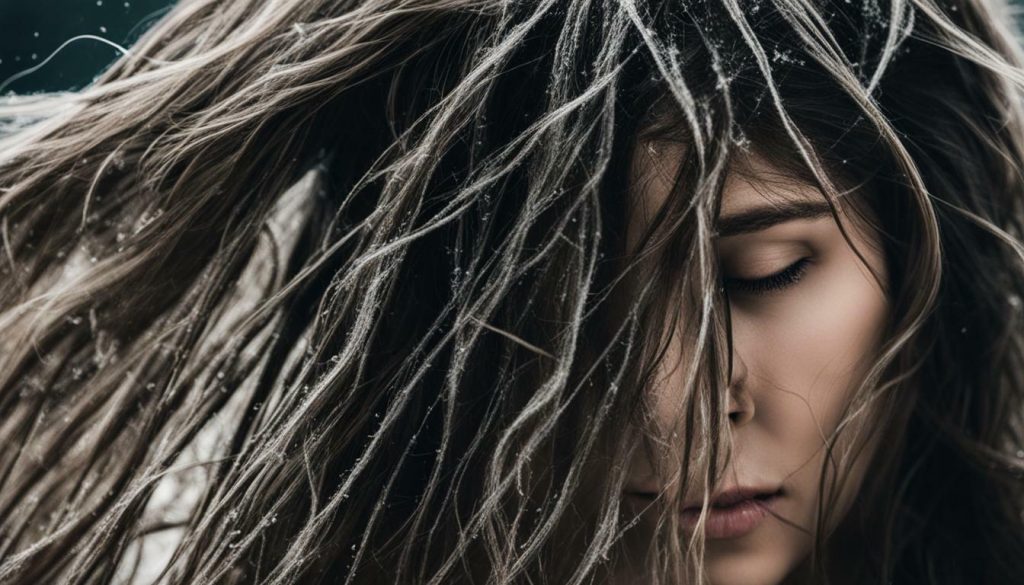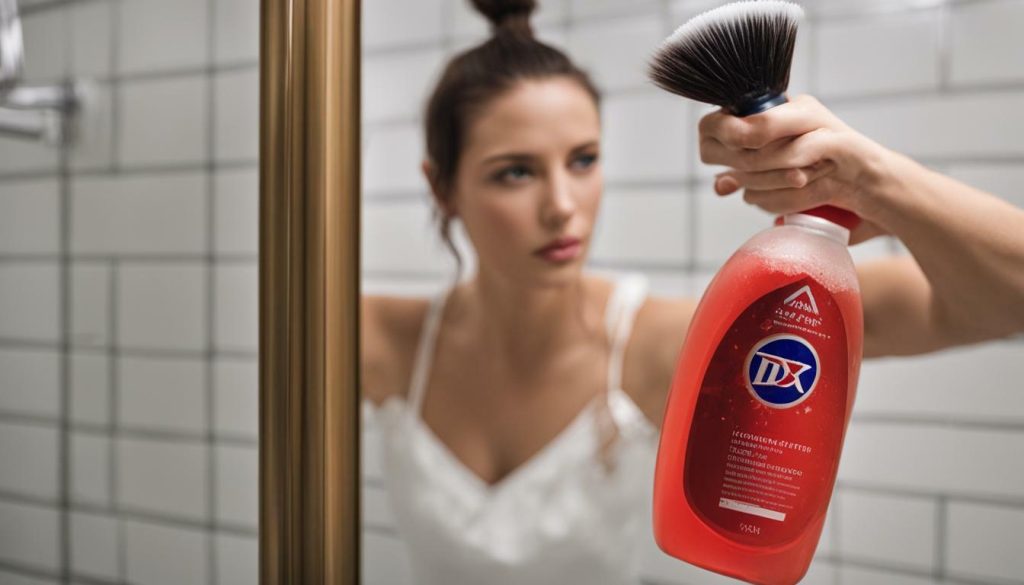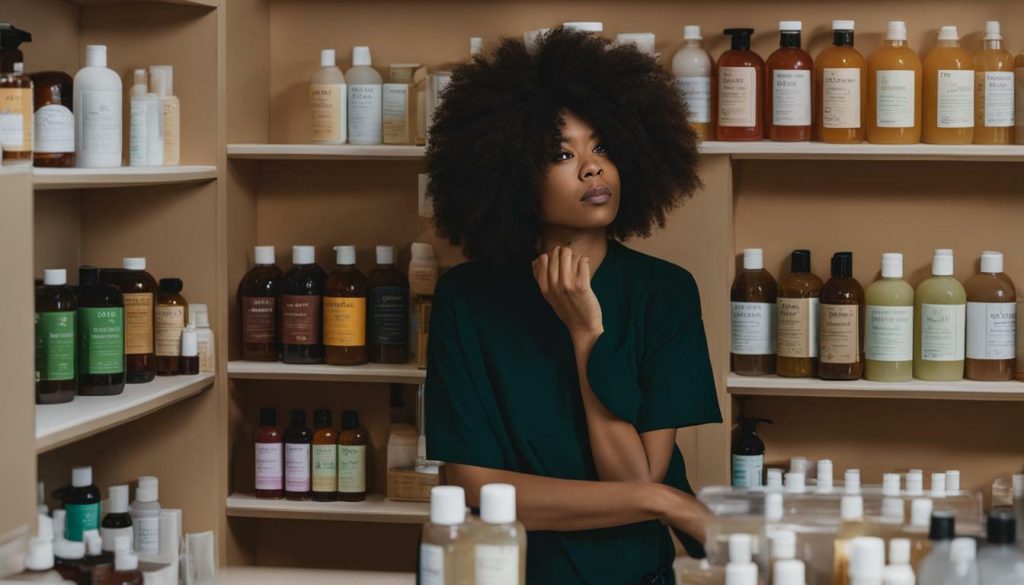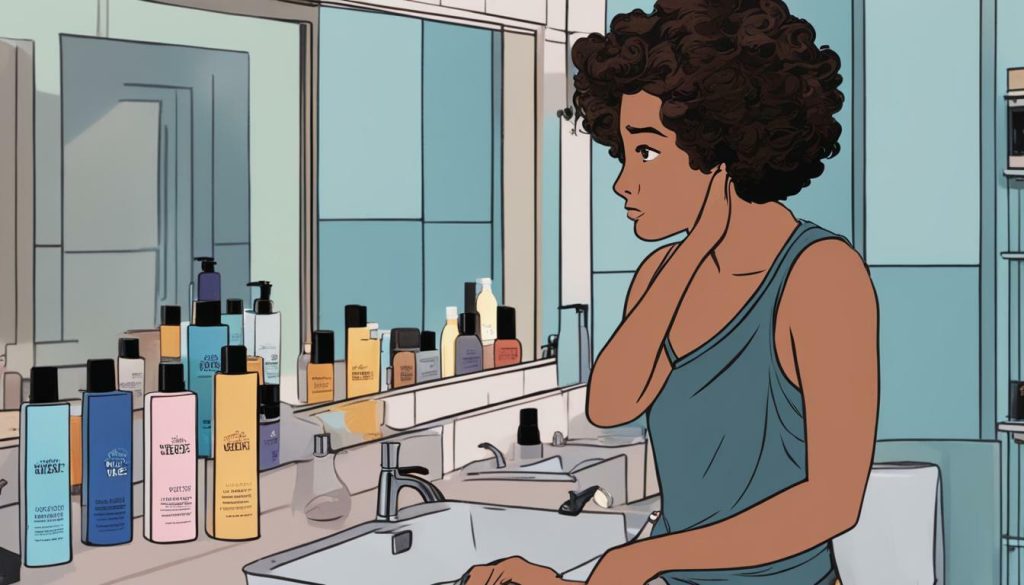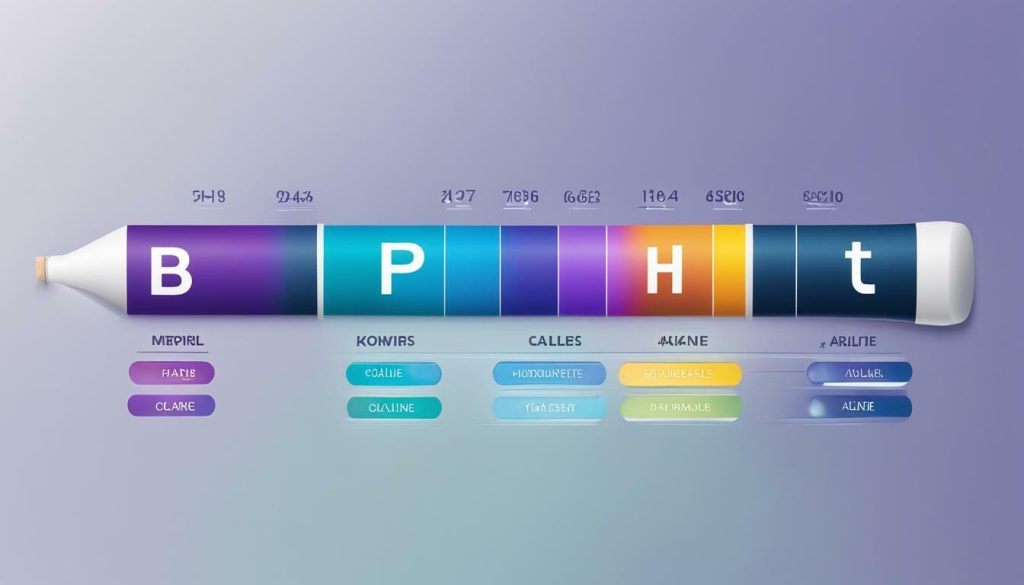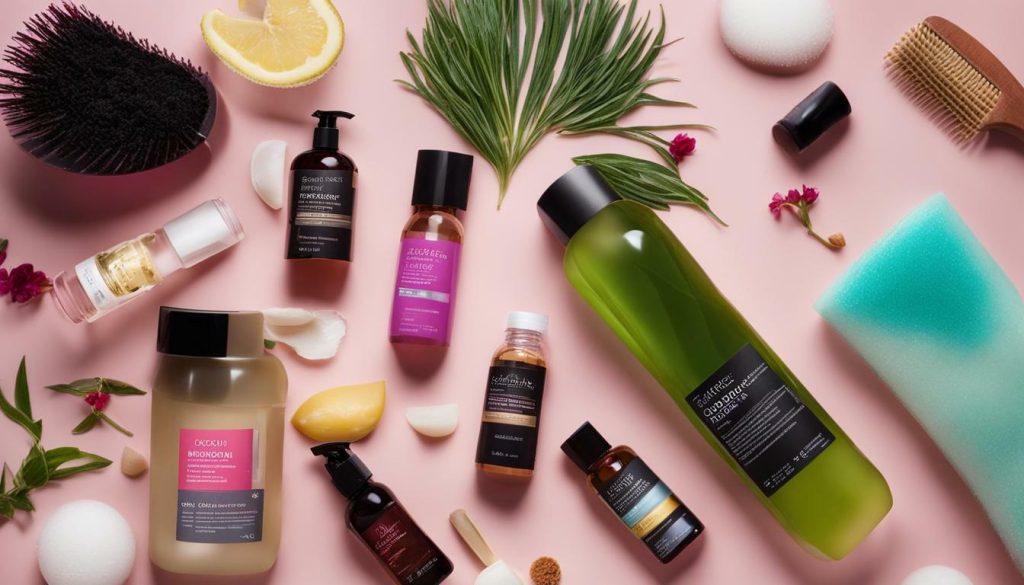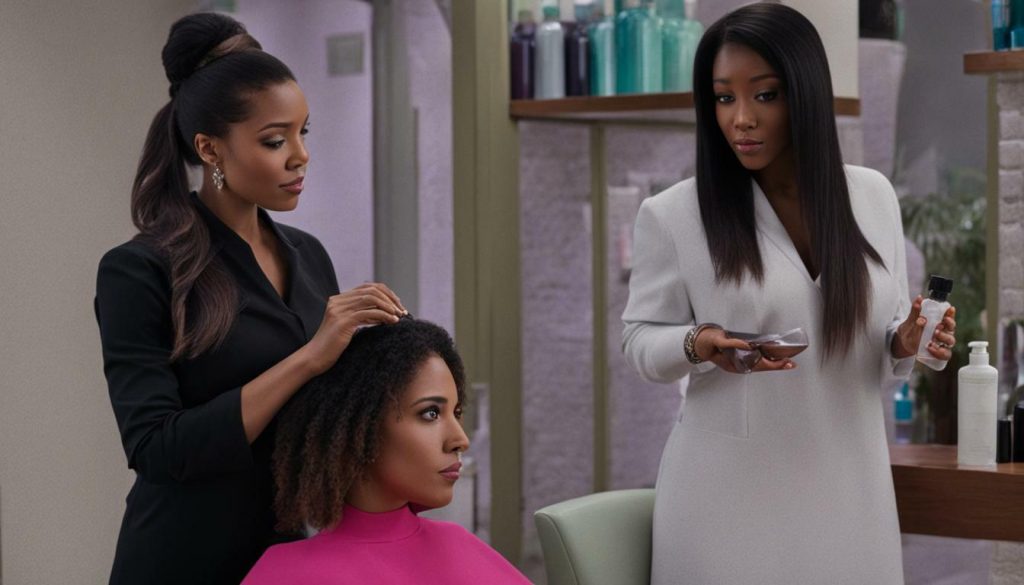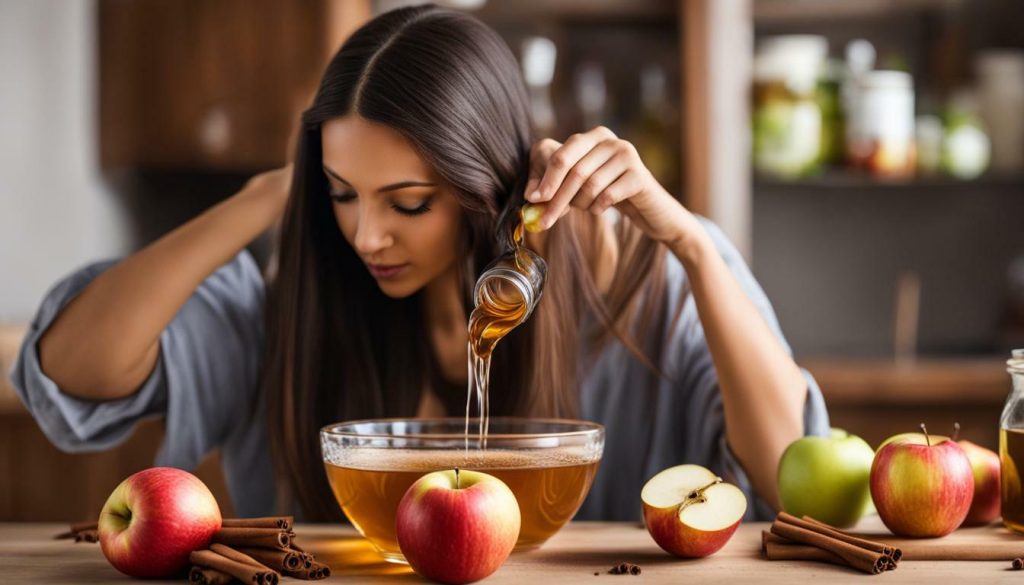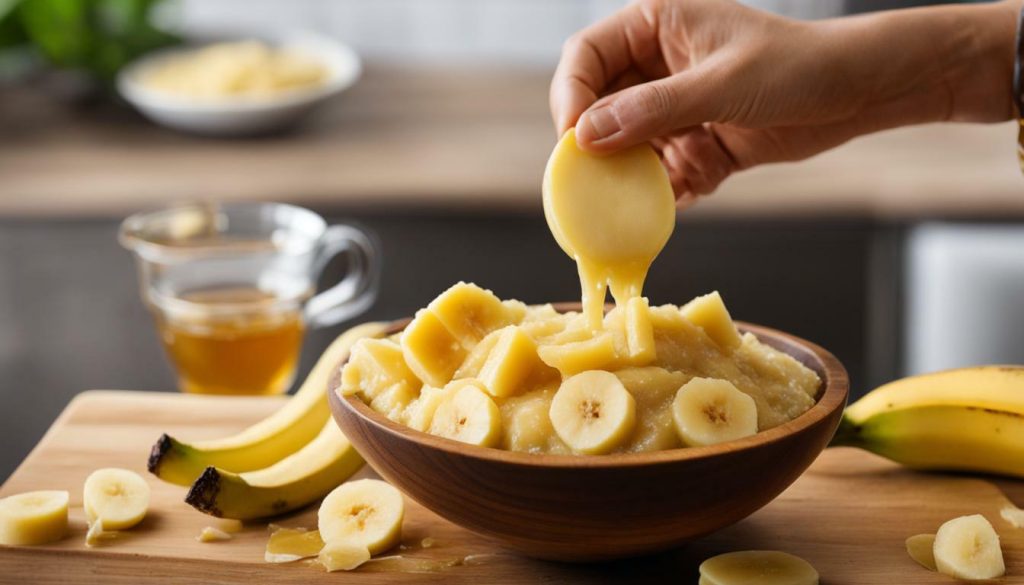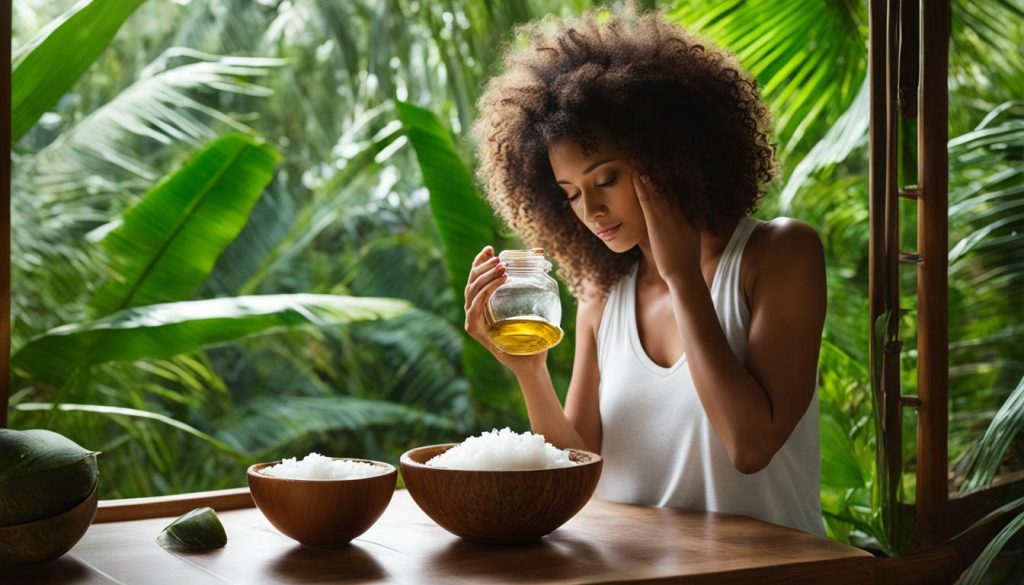When you’re running low on your favorite shampoo, it may be tempting to reach for the body wash instead. However, using body wash on your hair can have adverse effects, potentially leading to dryness, scalp irritation, and damage to the hair cuticles. In this section, we will explore the potential effects and risks of using body wash on your hair, as well as provide alternative options for maintaining hair health.
- Using body wash on your hair can lead to dryness, scalp irritation, and damage to the hair cuticles.
- There are alternative options, such as shampoo, conditioner, and specifically formulated hair products, that can help maintain hair health.
- Maintaining a balanced hair care routine, seeking professional guidance, and avoiding allergenic ingredients can also improve hair health.
Understanding Body Wash Composition
Before we explore the effects of using body wash on your hair, it’s important to understand the composition of body wash. Body wash typically contains a combination of cleansing agents, fragrances, and moisturizing ingredients. However, the composition of body wash differs from shampoo, which is specifically formulated for hair care.
The primary cleansing agent in body wash is typically sodium laureth sulfate, which is a surfactant that lathers and removes dirt and oil from the skin. While this ingredient is effective for body cleansing, it can be harsh on the scalp and hair. In addition to surfactants, body wash may contain fragrances and moisturizing ingredients such as glycerin and aloe vera. However, these ingredients may not be suitable for hair care and can lead to scalp irritation and excessive dryness.
If you compare the ingredients in body wash to those in shampoo, you’ll notice that shampoo contains specific ingredients that cater to hair health and promote a balanced pH level. For example, many shampoos contain panthenol, which is a form of vitamin B5 that strengthens hair and prevents breakage. Shampoo may also contain silicone to add shine and smoothness to the hair cuticles. To sum up, the composition of body wash may not be suitable for hair care, and it’s important to use hair-specific products for optimal hair health.
While it may seem like a convenient option, using body wash on your hair can have negative effects. Body wash is not formulated for use on hair, which has different needs and requires specific care.
Dryness: One of the potential effects of using body wash on hair is dryness. Body wash may strip the natural oils from your hair, leaving it feeling dry, brittle, and prone to breakage. This can also lead to an itchy and uncomfortable scalp.
Scalp irritation: Using body wash on your hair can cause irritation, inflammation, and even dandruff. This is because body wash may contain harsh chemicals that can irritate the scalp, leading to redness and itching.
Damage to hair cuticles: Body wash can cause severe damage to the hair cuticles, which are responsible for protecting and strengthening the hair. The harsh chemicals in body wash can break down the hair cuticles, leading to frizz, dryness, and split ends.
Overall impact on hair health: Using body wash on your hair regularly can significantly impact the overall health and appearance of your hair. It can lead to weak, lifeless hair that looks dull and lacks shine.
While it may seem tempting to use body wash as a quick substitute for shampoo, it’s important to consider its potential effects on your hair. Opting for hair care products specifically formulated for hair can help maintain hair health and prevent damage.
Potential Risks of Using Body Wash on Hair
While using body wash may seem like a convenient alternative to shampoo, it can pose significant risks to your hair and scalp.
The harsh chemical composition of body wash can strip your hair of its natural oils, leading to dryness, frizziness, and breakage. This dryness can also cause your scalp to become irritated, itchy, and prone to dandruff.
Repeated use of body wash on hair can cause long-term damage, including excessive hair loss and decreased hair growth. The ingredients in body wash can also damage the hair cuticles, which can result in split ends, weakened hair, and a dull appearance.
Allergic Reactions
Additionally, certain ingredients in body wash, such as fragrances and preservatives, can cause allergic reactions. If you experience redness, swelling, or itching after using body wash on your hair, discontinue use immediately and consult a dermatologist.
Overall, using body wash on your hair can lead to a myriad of negative effects and risks that can compromise the health and appearance of your hair.
If you want to avoid the negative effects and risks of using body wash on your hair, there are alternative options available. First and foremost, it’s important to use hair care products specifically formulated for hair use instead of body wash.
Shampoo: Shampoo is designed to cleanse the scalp and hair effectively while maintaining the natural oils that keep hair healthy. Look for shampoos that are tailored to your hair type, whether it be oily, dry, or color-treated. Avoid shampoos with harsh detergents or sulfates, as they can cause dryness and scalp irritation.
Conditioner: Conditioner helps to restore moisture to the hair and improve its texture, making it more manageable and less prone to damage. Choose conditioners that contain nourishing ingredients like coconut oil, shea butter, and aloe vera, depending on your hair’s needs.
Specifically Formulated Products: In addition to shampoo and conditioner, there are many other hair care products specifically formulated for different hair types and concerns. For example, you can find hair masks, serums, and leave-in conditioners that can help address issues like frizz, breakage, and lack of volume.
DIY Alternatives:
If you prefer natural or homemade hair care alternatives, there are a variety of remedies you can try. For example, a mixture of apple cider vinegar and water is a popular DIY hair rinse that can help remove build-up and balance the scalp’s pH level. Coconut oil, honey, and avocado are also commonly used in DIY hair masks to moisturize and nourish the hair.
However, it’s important to note that while these alternatives can be effective, they may not provide the same benefits as professionally formulated products, and some may even cause further damage to your hair. Therefore, it’s best to approach DIY remedies with caution and consult a hairstylist or trichologist if you have any concerns.
Proper Hair Care Routine
Maintaining a proper hair care routine is crucial for achieving and maintaining healthy hair.
Start by choosing the right shampoo and conditioner for your hair type. If you have oily hair, opt for a gentle, oil-free formula. If you have dry or damaged hair, select a moisturizing shampoo and conditioner. Be sure to rinse thoroughly to remove any buildup.
Washing your hair too frequently can strip it of natural oils, leading to dryness and damage. Aim to wash your hair every other day or every two days, depending on your hair type and lifestyle.
When conditioning your hair, focus on the mid-lengths and ends, as these areas tend to be drier and more prone to damage. Leave the conditioner on for a few minutes before rinsing thoroughly.
Avoid using hot water to wash your hair, as it can dry it out. Instead, use lukewarm or cool water to help seal the hair cuticle and lock in moisture.
After washing and conditioning your hair, gently towel-dry it and avoid rubbing it vigorously, as this can cause damage. If you must use heat styling tools such as blow dryers or straighteners, use a heat protectant spray and keep the temperature below 350 degrees Fahrenheit.
Regular trims can help prevent split ends and keep your hair looking healthy. Aim to get a trim every six to eight weeks, or as needed.
Finally, consider adding additional treatments to your hair care routine, such as hair masks or oil treatments, to nourish and strengthen your hair.
Importance of pH Balance in Hair Products
The pH balance of hair products is crucial for maintaining healthy hair. The pH level of a product refers to its acidity or alkalinity, and it can affect how your hair looks and feels.
Your hair has a natural pH level of around 4.5 to 5.5, which is slightly acidic. Using hair products that are too alkaline can raise the hair cuticles, leading to frizziness, dryness, and breakage. On the other hand, products that are too acidic can cause your hair to become dull, flat, and greasy.
To ensure that your hair care products are pH balanced, look for products that have a pH level that falls within the ideal range of 4.5 to 5.5. Some products may have a pH level listed on the label, while others may require further research and inquiry with the manufacturer or hair care professional.
It’s essential to use pH balanced products to maintain a natural and healthy hair balance. Unbalanced pH levels can lead to all sorts of hair problems and damage, including scalp irritation, hair loss, and dandruff.
When it comes to choosing hair care products, opt for those that contain natural and nourishing ingredients such as aloe vera, jojoba oil, and vitamin E. These ingredients help to prevent dryness and breakage while promoting healthy hair growth.
Conclusion
Maintaining a balanced pH level in your hair care products is crucial for maintaining the health and appearance of your hair. By using pH-balanced products and incorporating natural, nourishing ingredients into your hair care routine, you can achieve healthy, lustrous hair.
Common Ingredients in Hair Care Products
When choosing hair care products, it’s essential to understand the ingredients listed on the label. Knowing what to look for (and what to avoid) can help you maintain the health and appearance of your hair. Here are some common ingredients found in hair care products:
Sodium Lauryl Sulfate (SLS) and Sodium Laureth Sulfate (SLES)
SLS and SLES are surfactants commonly found in shampoos. They create a lather that helps cleanse the hair. However, they can also strip the hair of its natural oils, leading to dryness and irritation. If you have sensitive skin or scalp, it’s best to avoid products containing these ingredients.
Parabens
Parabens are preservatives that prevent bacteria and mold growth in hair care products. However, they can mimic estrogen in the body, potentially disrupting hormone function and leading to health issues. Look for products labeled “paraben-free” or containing natural preservatives such as vitamin E.
Silicones
Silicones provide a smooth, shiny finish to the hair. However, they can also cause buildup, making the hair appear greasy and weighed down. Look for products labeled “silicone-free” if you prefer a more natural look and feel.
Alcohol
Alcohol is used in hair care products to help dissolve oils and other ingredients. However, it can also be very drying, leading to frizz and breakage. Look for products containing fatty alcohols like cetyl and stearyl alcohol, which are less drying and can even help moisturize the hair.
Fragrances are added to hair care products to mask unpleasant smells and provide a pleasant scent. However, some people may be sensitive to certain fragrances, leading to allergic reactions or headaches. Look for products labeled “fragrance-free” or containing natural essential oils if you have sensitive skin or scalp.
Overall, understanding the common ingredients found in hair care products can help you make informed decisions about what to use on your hair. Remember to read labels carefully and choose products that suit your hair type and specific needs.
Consultation with Hair Care Professionals
If you have concerns about the condition of your hair or need personalized advice, seeking guidance from hair care professionals is highly recommended. Consulting with hairstylists or trichologists can help assess your hair’s specific needs and provide tailored recommendations for maintaining its health.
Hairstylists are trained professionals who specialize in hair care, styling, and cutting, while trichologists are hair and scalp specialists who can diagnose and treat hair and scalp disorders.
During a consultation, a hairstylist or trichologist will examine your hair and scalp, evaluate its condition, and recommend appropriate hair care products and treatments. They will also provide tips on how to maintain a healthy hair care routine and prevent further damage or hair loss.
Consulting with hair care professionals can be particularly beneficial if you have a specific hair or scalp condition, such as dandruff, psoriasis, or alopecia. They can provide personalized treatment plans that incorporate medicated shampoos, supplements, and other specialized treatments.
When choosing a hair care professional, consider factors such as their experience, qualifications, and reputation. Read reviews and ask for recommendations from friends or family members who have had positive experiences with hair care professionals.
Overall, consulting with hair care professionals can be an essential step in achieving and maintaining healthy and beautiful hair. They can provide valuable guidance and personalized care, helping you achieve your hair goals.
DIY Hair Care Remedies
If you prefer natural or homemade alternatives for your hair care, here are some DIY remedies you can try at home:
1. Apple Cider Vinegar Rinse
Apple cider vinegar can be used as a natural hair cleanser that removes buildup and adds shine to your hair. Mix one part apple cider vinegar with two parts water, and use it as a final rinse after shampooing your hair.
SEO relevant keywords: DIY hair care remedies, apple cider vinegar, natural hair cleanser, removes buildup, adds shine
A banana and honey hair mask can help moisturize dry and damaged hair. Mash one banana and mix it with one tablespoon of honey. Apply the mixture to your hair, leave it on for 30 minutes, and then rinse it off with lukewarm water.
SEO relevant keywords: DIY hair care remedies, banana and honey hair mask, moisturizes dry hair, repairs damaged hair
Coconut oil can be used as a natural scalp treatment that can help soothe an itchy and irritated scalp. Warm up the coconut oil and massage it into your scalp. Leave it on for 30 minutes before washing it out with shampoo.
SEO relevant keywords: DIY hair care remedies, coconut oil scalp treatment, soothes itchy scalp, relieves scalp irritation
While these DIY remedies can offer some benefits, it’s important to note that they may not be as effective as professionally formulated hair care products. Use them with caution and do a patch test before applying them to your hair.
Conclusion
Using body wash on your hair may seem like a convenient solution, but it can lead to negative effects and risks. The harsh ingredients in body wash can cause dryness, scalp irritation, and damage to the hair cuticles. To avoid these issues, it is best to use proper hair care products, such as shampoo and conditioner.
Consulting with hair care professionals and following a balanced hair care routine can help you achieve and maintain healthy, lustrous hair. It is also important to pay attention to the pH balance of your hair care products and to avoid ingredients that can be harmful to your hair.
If you prefer natural or homemade hair care alternatives, you can try DIY remedies using common household ingredients. However, it is important to note that these remedies may not be as effective as professionally formulated products.
In conclusion, taking care of your hair is crucial for hair health. By using the right products, following a balanced hair care routine, and seeking guidance from hair care professionals, you can maintain healthy and beautiful hair.

Hey there! I’m Dr. Mary Noland, your trusted authority in dermatology. My 17-year rollercoaster ride in skin science has been nothing short of a masterclass. Whether you’re a newbie or a familiar face, I’m here with open arms and Medicare-friendly services, dedicated to creating your perfect skin haven.
But hold up! There’s more to me. When I’m not elbow-deep in dermatology, I’m lighting up derma blogs with insights that peel back the layers of skin health. Also, as the proud captain of ‘buybodywash.com‘, I provide all the body care goodness you need!
Trust me; I’m more than just a white coat. I’m here to lend an ear, share a laugh, and bring calm with a reassuring voice that’s comforted countless patients.
So, meet Dr. Mary Noland – your dermatologist and your guide and friend on the path to radiant skin. I am excited to meet you soon!

